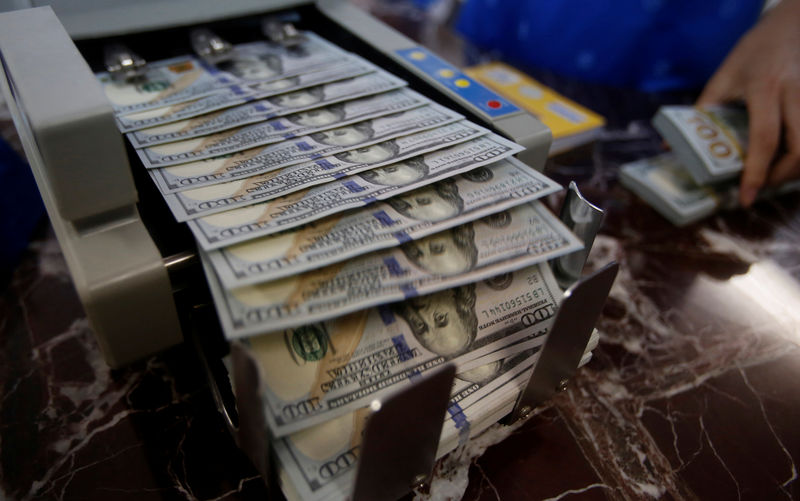By Rodrigo Campos
NEW YORK (Reuters) - Stocks fell sharply on Thursday while the Japanese yen rose in a move toward safety assets, with traders citing the Sino-U.S. trade war, Italy's budget concerns and a widening gap between the United States and Saudi Arabia.
European stocks closed near the day's lows and Wall Street slid after the European Commission said Italy's 2019 budget draft is in "particularly serious" breach of EU budget rules, a step that prepares the ground for what would be an unprecedented rejection of a member state's fiscal plan.
Italy's 5-year yield hit its highest since October 2013 and its 10-year yield (IT10YT=RR) brushed against a 4-1/2 year high. The safe-haven yen rose for the eighth session in the last 11.
Also weighing on market sentiment, U.S. Treasury Secretary Steven Mnuchin said he would not attend next week's investment conference in Saudi Arabia. U.S. President Donald Trump said on Thursday it "certainly looks" like U.S.-based Saudi journalist Jamal Khashoggi is dead.
Khashoggi was last seen entering the Saudi consulate in Istanbul.
Worries over rising U.S. rates and a stronger dollar added to the sour tone, as well as the effect of a trade war between Washington and Beijing. Shanghai's benchmark stock index (SSEC) tumbled overnight to close at a near four-year low and China's premier warned of risks to the economy.
"The acceleration in market decline coincided with news that Treasury Secretary Mnuchin is the latest official to pull out of the upcoming Saudi Arabian investment conference," said Ryan Larson, head of U.S. equity trading at RBC Global Asset Management in Chicago.
"Certainly other factors are at play as well – China being down 2.9 percent, the Italian budget debate and potential spillover implications for the global economy, etc," he said.
The Dow Jones Industrial Average (DJI) fell 327.23 points, or 1.27 percent, to 25,379.45, the S&P 500 (SPX) lost 40.43 points, or 1.44 percent, to 2,768.78 and the Nasdaq Composite (IXIC) dropped 157.56 points, or 2.06 percent, to 7,485.14.
The pan-European STOXX 600 index (STOXX) lost 0.51 percent and MSCI's gauge of stocks across the globe (MIWD00000PUS) shed 1.21 percent.
Emerging market assets were weighed down by the rising dollar and concerns about higher U.S. interest rates.
"The last thing emerging markets, or the U.S. yield curve or equities, want is a reminder that U.S. rates are going to keep going up," Rabobank analysts told clients in a note.
Emerging market stocks lost 1.30 percent, while MSCI's broadest index of Asia-Pacific shares outside Japan (MIAPJ0000PUS) closed 0.81 percent lower.
DOLLAR REMAINS STRONG
The dollar rose as minutes of the Federal Reserve's latest meeting showed that every Fed policymaker backed raising interest rates last month and also generally agreed that borrowing costs were set to rise further.
That reinforced expectations that U.S. yields will rise further despite President Donald Trump's view that the Fed is tightening too much. The greenback extended Wednesday's gains against a basket of its rivals on the Fed's perceived hawkish stance.
The dollar index (DXY) rose 0.39 percent, with the euro (EUR=) down 0.41 percent to $1.1452. Sterling
The safe-haven Japanese yen strengthened 0.41 percent versus the greenback at 112.19 per dollar.
Oil prices fell on concerns that the trade war will slow global growth and demand for crude and as U.S. crude inventories suggested ample supply. The Saudi-U.S. tension and falling Iranian exports kept the decline in check.
"The real driver of this correction is concerns surrounding demand growth and trade issues," said Gene McGillian, vice president of market research for Tradition Energy in Stamford, Connecticut. "The world has backed off its highs."
U.S. crude (CLc1) fell 1.51 percent to $68.70 per barrel and Brent (LCOc1) was last at $79.35, down 0.87 percent on the day.
In the Treasuries market, the 10-year yield was little changed after earlier rising to a one-week high as the equities sell-off offset worries about the number of upcoming interest rate increases from the Fed.
Benchmark 10-year notes
Metals fell on concern over Chinese growth.
Copper
Three-month nickel on the London Metal Exchange
